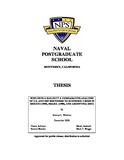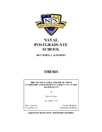Who gets a bailout? A comparative analysis of U.S. and IMF responses to economic crisis in Mexico (1995), Brazil (1998), and Argentina (2001)
| dc.contributor.advisor | Jaskoski, Maiah | |
| dc.contributor.author | Watkins, Jeremy L. | |
| dc.date.accessioned | 2012-03-14T17:41:34Z | |
| dc.date.available | 2012-03-14T17:41:34Z | |
| dc.date.issued | 2009-12 | |
| dc.identifier.uri | https://hdl.handle.net/10945/4329 | |
| dc.description.abstract | This thesis seeks to explain why the U.S. government came to the assistance of the Mexican and Brazilian governments in 1995 and 1998 respectively, but refused to do so during Argentina's economic crisis in 2001. At first glance, all three countries appeared to be attractive candidates for U.S. assistance - they had simiarly enacted U.S.-backed neoliberal reformist agendas prior to their crises. The study argues that the decision by the U.S. government and the International Monetary Fund to issue a bailout to a country enduring an economic crisis is a carefully considered policy choice that results from a combination of that country's geopolitical significance, as well as the ability of U.S. policymakers to learn and apply lessons from past policy experiences. | en_US |
| dc.description.uri | http://archive.org/details/whogetsbailoutac109454329 | |
| dc.format.extent | x, 61 p. ; | en_US |
| dc.publisher | Monterey, California. Naval Postgraduate School | en_US |
| dc.subject.lcsh | Economics | en_US |
| dc.subject.lcsh | Economic assistance | en_US |
| dc.title | Who gets a bailout? A comparative analysis of U.S. and IMF responses to economic crisis in Mexico (1995), Brazil (1998), and Argentina (2001) | en_US |
| dc.type | Thesis | en_US |
| dc.contributor.secondreader | Berger, Mark T. | |
| dc.contributor.corporate | Naval Postgraduate School (U.S.) | |
| dc.description.service | US Navy (USN) author. | en_US |
| dc.identifier.oclc | 503306049 | |
| etd.thesisdegree.name | M.A. | en_US |
| etd.thesisdegree.level | Masters | en_US |
| etd.thesisdegree.discipline | Security Studies | en_US |
| etd.thesisdegree.grantor | Naval Postgraduate School | en_US |
| etd.verified | no | en_US |
| dc.description.distributionstatement | Approved for public release; distribution is unlimited. |
Files in this item
This item appears in the following Collection(s)
-
1. Thesis and Dissertation Collection, all items
Publicly releasable NPS Theses, Dissertations, MBA Professional Reports, Joint Applied Projects, Systems Engineering Project Reports and other NPS degree-earning written works.





